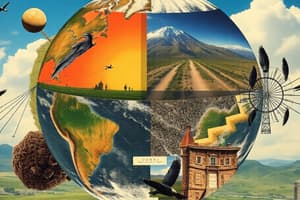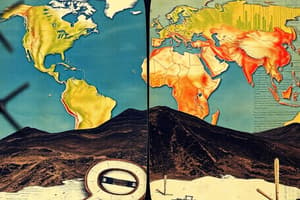Podcast
Questions and Answers
What significant time period is referred to when discussing human development since the last ice age?
What significant time period is referred to when discussing human development since the last ice age?
- 11,700 years ago (correct)
- 5000 years ago
- 20,000 years ago
- 30,000 years ago
What does Section III of the resource guide primarily focus on?
What does Section III of the resource guide primarily focus on?
- Global warming caused by human activity (correct)
- Future predictions of climate change
- Technological advances in writing
- Historical interaction between humans and climate
Which section of the guide examines the responses to climate change awareness?
Which section of the guide examines the responses to climate change awareness?
- The Anthropocene
- Responding to the Climate Crisis (correct)
- Humans in the Holocene
- Conceptualizing Climate Change
What does the term 'Anthropocene' refer to?
What does the term 'Anthropocene' refer to?
What characterizes the current climate change scenario compared to previous ice ages?
What characterizes the current climate change scenario compared to previous ice ages?
Since what year have scholars theorized that the world has entered a new era of climate history?
Since what year have scholars theorized that the world has entered a new era of climate history?
Why is it important to pay attention to the methods used in a given field when studying climate change?
Why is it important to pay attention to the methods used in a given field when studying climate change?
What important transformation occurred in human societies over the past ten thousand years?
What important transformation occurred in human societies over the past ten thousand years?
Why is it difficult to establish a causal link between climate change and human development?
Why is it difficult to establish a causal link between climate change and human development?
What approach is suggested to gain a well-rounded picture of the history of climate change?
What approach is suggested to gain a well-rounded picture of the history of climate change?
Which concept describes how scholars organize knowledge of past climates?
Which concept describes how scholars organize knowledge of past climates?
Which tools do scientists and social scientists use to understand climate change?
Which tools do scientists and social scientists use to understand climate change?
What is one outcome of recognizing human contribution to climate change?
What is one outcome of recognizing human contribution to climate change?
What is one factor that influences the Earth's climate to change dramatically?
What is one factor that influences the Earth's climate to change dramatically?
What do scholars use as clues for reconstructing climate history?
What do scholars use as clues for reconstructing climate history?
In the context of climate change study, what is meant by a robust conceptualization?
In the context of climate change study, what is meant by a robust conceptualization?
What is the primary vision of the United States Academic Decathlon?
What is the primary vision of the United States Academic Decathlon?
What does the term 'Anthropocene' refer to in the context of climate change?
What does the term 'Anthropocene' refer to in the context of climate change?
What term is sometimes used synonymously with geosphere?
What term is sometimes used synonymously with geosphere?
According to Earth System Science (ESS), which of the following subsystems is NOT typically included?
According to Earth System Science (ESS), which of the following subsystems is NOT typically included?
Which human activity has accelerated the Earth's natural carbon cycle?
Which human activity has accelerated the Earth's natural carbon cycle?
Which section discusses the concerns regarding the use of the term 'Anthropocene'?
Which section discusses the concerns regarding the use of the term 'Anthropocene'?
What role do mountain ranges play in weather patterns?
What role do mountain ranges play in weather patterns?
What is one focus area of Section I of the resource guide?
What is one focus area of Section I of the resource guide?
Which of the following is a major event that influences climate history?
Which of the following is a major event that influences climate history?
What does mapping climate onto existing global history help in understanding?
What does mapping climate onto existing global history help in understanding?
Which organization is responsible for the copyright of the resource guide?
Which organization is responsible for the copyright of the resource guide?
What constitutes the Earth’s climate system?
What constitutes the Earth’s climate system?
What is a key purpose of the introduction in Section I?
What is a key purpose of the introduction in Section I?
What is the primary source of external energy for the Earth?
What is the primary source of external energy for the Earth?
How does the composition of the soil get influenced?
How does the composition of the soil get influenced?
Which subsystems interact to shape the weather and climate?
Which subsystems interact to shape the weather and climate?
What do scholars refer to as the 'archives of nature'?
What do scholars refer to as the 'archives of nature'?
Which climatic phenomenon can lead to colder than typical conditions in North America?
Which climatic phenomenon can lead to colder than typical conditions in North America?
How does lake effect snow impact the Earth's surface temperature?
How does lake effect snow impact the Earth's surface temperature?
What is an example of a climatic condition that can leave traces in the natural world?
What is an example of a climatic condition that can leave traces in the natural world?
What historical timeframe do Sections II and III of the guide cover regarding human interactions with climate?
What historical timeframe do Sections II and III of the guide cover regarding human interactions with climate?
What is one direct effect of clouds formed over the Great Lakes?
What is one direct effect of clouds formed over the Great Lakes?
Which component is NOT one of the subsystems influenced by climate?
Which component is NOT one of the subsystems influenced by climate?
What role does ice play in relation to solar energy and the Earth's surface?
What role does ice play in relation to solar energy and the Earth's surface?
What significant geological event occurred around 20,000 years ago?
What significant geological event occurred around 20,000 years ago?
During which epoch did most of human history take place, characterized by glacial cycles?
During which epoch did most of human history take place, characterized by glacial cycles?
Which of the following statements is NOT true about the climate during the Last Glacial Maximum?
Which of the following statements is NOT true about the climate during the Last Glacial Maximum?
Which statement accurately reflects the relationship between climate and human development?
Which statement accurately reflects the relationship between climate and human development?
What was a notable impact of the Last Glacial Maximum on global geography?
What was a notable impact of the Last Glacial Maximum on global geography?
What was the global human population estimated to be before the Holocene?
What was the global human population estimated to be before the Holocene?
What significant environmental condition prevailed in much of Asia during the Last Glacial Maximum?
What significant environmental condition prevailed in much of Asia during the Last Glacial Maximum?
How does the text characterize the role of climate in shaping human history?
How does the text characterize the role of climate in shaping human history?
Flashcards
Earth System Science (ESS)
Earth System Science (ESS)
The study of the Earth as a complex system, including its various components (subsystems) like the atmosphere, lithosphere, hydrosphere, biosphere, and cryosphere, and their interactions.
Geosphere
Geosphere
The solid, non-living part of the Earth, including rocks, minerals, soil, and landforms.
Atmosphere
Atmosphere
The layer of gases surrounding the Earth, including nitrogen, oxygen, carbon dioxide, and other trace gases.
Hydrosphere
Hydrosphere
Signup and view all the flashcards
Biosphere
Biosphere
Signup and view all the flashcards
Cryosphere
Cryosphere
Signup and view all the flashcards
Climate
Climate
Signup and view all the flashcards
Climate Change
Climate Change
Signup and view all the flashcards
Anthropocene
Anthropocene
Signup and view all the flashcards
Climate Proxies
Climate Proxies
Signup and view all the flashcards
Multidisciplinary Approach
Multidisciplinary Approach
Signup and view all the flashcards
Climate Equilibrium
Climate Equilibrium
Signup and view all the flashcards
Dramatic Climate Change
Dramatic Climate Change
Signup and view all the flashcards
Climate History
Climate History
Signup and view all the flashcards
Climate Change and Society
Climate Change and Society
Signup and view all the flashcards
Holocene Epoch
Holocene Epoch
Signup and view all the flashcards
Anthropocene Epoch
Anthropocene Epoch
Signup and view all the flashcards
Global Warming
Global Warming
Signup and view all the flashcards
Climate Change Social Science
Climate Change Social Science
Signup and view all the flashcards
Climate Change Responses
Climate Change Responses
Signup and view all the flashcards
Climate Shifts
Climate Shifts
Signup and view all the flashcards
Post Ice Age Human Transformation
Post Ice Age Human Transformation
Signup and view all the flashcards
What is the Geosphere?
What is the Geosphere?
Signup and view all the flashcards
What is Earth System Science?
What is Earth System Science?
Signup and view all the flashcards
What is the Carbon Cycle?
What is the Carbon Cycle?
Signup and view all the flashcards
How is Earth's Climate System an Open System?
How is Earth's Climate System an Open System?
Signup and view all the flashcards
What are Climate Forcings?
What are Climate Forcings?
Signup and view all the flashcards
Where do Geosphere Interactions Occur?
Where do Geosphere Interactions Occur?
Signup and view all the flashcards
How have humans affected the Carbon Cycle?
How have humans affected the Carbon Cycle?
Signup and view all the flashcards
How does the Geosphere affect Climate?
How does the Geosphere affect Climate?
Signup and view all the flashcards
Archives of Nature
Archives of Nature
Signup and view all the flashcards
Human Interactions With Climate
Human Interactions With Climate
Signup and view all the flashcards
Climate Influences Earth Systems
Climate Influences Earth Systems
Signup and view all the flashcards
Traces of Climate Impacts
Traces of Climate Impacts
Signup and view all the flashcards
Studying Climate History
Studying Climate History
Signup and view all the flashcards
Figuring Out What Happened
Figuring Out What Happened
Signup and view all the flashcards
Earth System Interactions
Earth System Interactions
Signup and view all the flashcards
Pleistocene Epoch
Pleistocene Epoch
Signup and view all the flashcards
Last Glacial Maximum (LGM)
Last Glacial Maximum (LGM)
Signup and view all the flashcards
Study Notes
Introduction
- A changing climate can transform humanity
- Humans lived in an ice age for 100,000 years
- Then, around 11,700 years ago, the ice age ended
- Human societies have developed rapidly since
- Humans are now the cause of the current climate change
Section I: Conceptualizing Climate Change in the Past and Present
- Earth System Science (ESS) views Earth as a system
- The Earth's subsystems (geosphere, hydrosphere, atmosphere, and biosphere) interact to shape climate
- Forcings (solar energy, volcanoes, and greenhouse gases) alter climate
- Positive feedbacks amplify climate change
- Negative feedbacks moderate climate change
- Archives of nature (ice cores, sedimentation, trees) and society (instrumental records, narrative records) provide information about past climates
- Proxies (natural features) reveal past climate conditions
Section II: Humans in the Holocene
- The Holocene began 11,700 years ago
- Characteristics of the Early, Middle, and Late Holocene
- Human societies developed and thrived
- Climate change impacted early societies in various ways
Section III: The Anthropocene
- The Anthropocene is a new geological epoch
- Marked by significant human impact on Earth
- The Industrial Revolution and the burning of fossil fuels are key contributors
- Global production of greenhouse gases.
Section IV: Responding to the Climate Crisis
- Climate scientists and much of the public agree on the existence of a climate crisis
- Early public warnings about climate change
- Opposition to Climate action (e.g., U.S. opposition to the Kyoto Protocol)
- The role of the news media in shaping public opinion
- Political responses to the crisis (e.g., Green New Deal, Inflation Reduction Act)
- Recent action concerning climate change and efforts to mitigate its impacts.
Studying That Suits You
Use AI to generate personalized quizzes and flashcards to suit your learning preferences.
Related Documents
Description
Test your knowledge on the impacts of climate change throughout history and its current effects on humanity. Explore the Earth System Science, human contributions, and historical climate records. This quiz highlights key concepts related to our changing environment since the end of the last ice age.




